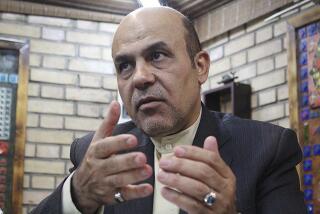Ayatollah Sadeq Khalkhali, 77; Iran’s ‘Hanging Judge’
- Share via
TEHRAN — Ayatollah Sadeq Khalkhali, who became known as the Iranian revolution’s “Hanging Judge” for ordering summary executions after trials of only a few minutes, has died. He was 77.
His son, Mohammad Givi-Khalkhali, attributed the death to old age and illnesses of the heart and brain, the state-run Islamic Republic News Agency said Thursday. He had undergone surgery in a Tehran hospital before he died late Wednesday, the report said.
Khalkhali earned his nickname for the ease with which he condemned defendants to death. He was the most feared of the judges appointed soon after the U.S.-backed Shah Mohammad Reza Pahlavi was deposed in 1979.
As president of the Islamic Revolutionary Court, Khalkhali was prosecutor, judge and jury for those deemed counterrevolutionaries and for people charged with being drug dealers.
In his autobiography, Khalkhali wrote that he ordered executions for 85 members of the shah’s government and security forces. But other Iranians said he sent hundreds to their deaths without fair trial during his two years on the bench. Dissidents accused him of executing thousands.
Some of his trials lasted only minutes.
It was widely reported in Iran that when Nematollah Nasiri, the head of the shah’s feared Savak secret police, went before Khalkhali, the judge picked up a pistol and shot him dead.
Abbas Hoveida, the shah’s longest-serving prime minister, had two brief appearances before Khalkhali and then was led outside accompanied by the judge. A shot was fired, and Khalkhali returned to the courtroom and announced the sentence had been carried out. It was not revealed who fired the bullet into the back of Hoveida’s head.
In retirement, Khalkhali was unrepentant. He said the leader of the Islamic revolution, Ayatollah Ruhollah Khomeini, had given him wide powers and it was necessary to use them.
“I believe, and still believe, that all members of the shah’s parliament and senate and all provincial governors and generals should have been sentenced to death,” Khalkhali wrote in his autobiography, “Ayatollah Khalkhali Remembers,” published in 2000.
“But only a few of them were sentenced to death, and most of them left the country,” he added.
In his final years, Khalkhali supported some of the liberalization ideas promoted by President Mohammad Khatami and other reformers. But the reformist movement, which has spent years fighting Iran’s dominant unelected hard-line clerics, never embraced the former judge.
Khalkhali was a judge until 1981, when he was forced to resign because of a failure to account for millions of dollars seized in raids on drug traffickers and amassed from court fines.
He served eight years in parliament, where he headed the foreign policy committee. He then taught religious studies in Qom before stopping work in 2002 after suffering a stroke.
More to Read
Sign up for Essential California
The most important California stories and recommendations in your inbox every morning.
You may occasionally receive promotional content from the Los Angeles Times.













